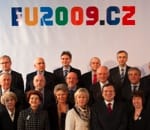The Czech Presidency was met with some apprehension for various reasons. The country does not belong to the eurozone, nor has it ratified the Lisbon Treaty yet.
The Prime Minister, Mirek Topolanek, leads a more or less united coalition government, which could put him in a position of weakness while the President of the Republic, Vaclav Klaus, displays a fully assumed Euro-scepticism, stating among other things that “nothing will happen under the Czech Presidency.”
The crisis seems to disrupt this minimal agenda
Mr. Topolanek is a pro-European himself. However, as a liberal committed to the free market, he is somewhat critical of the interventionist reflexes adopted by some EU states.
This caused friction with France when Nicolas Sarkozy stated on February 5th that “if we give money to the automotive industries to restructure, it’s not to learn that a new factory is going to move to the Czech Republic.”
The Czech presidency reacted by issuing a statement condemning all forms of protectionism: “The French President wishes to protect the interests of his country and I, as the Czech Prime Minister and President of the European Council, will defend the principle of the same rules for everyone.”
This war of communiqués is more serious than it seems. It highlights the limits of European solidarity, the divide between poorer countries and better-off countries, the ghost of the Wall and its multiple specters, the arrogance of some, the intransigence of others, and the retreat into oneself of the least saying. It is hoped that the voters on June 7, 2009, will have the wisdom to see their vote as a birth certificate rather than a deposit in a morbid urn.
For the Czech Presidency aimed to implement the “3 E program”: Economy, Energy, Europe and the World. And the Czechs have not remained inactive. As a reminder, Mr. Topolanek met with Mr. Putin to resolve the gas supply issues in Europe. He is also working to strengthen the EU’s alliance with the USA. A summit focused on an Eastern partnership, with countries such as Ukraine, Belarus, Georgia, Armenia, Azerbaijan, and Moldova, will take place in Prague in April 2009.
On March 1, 2009, at the initiative of Mr. Topolanek and the President of the European Commission, Mr. Barroso, an informal summit will take place in Brussels. This meeting will be devoted to measures taken by European states to address the crisis. Perhaps they will also discuss the desire of some Eastern European countries, led by Hungary, to join the Eurozone in order to better resist speculators and defend their economies.
To be continued.
For the curious, here are some websites to learn more about Czech history, political and cultural personalities, and gastronomy:
– www.eu2009.cz
– www.archi.radio.cz/français
– www.czech.cz/fr.culture
– www.2travellandeat.com/rep.tcheque


